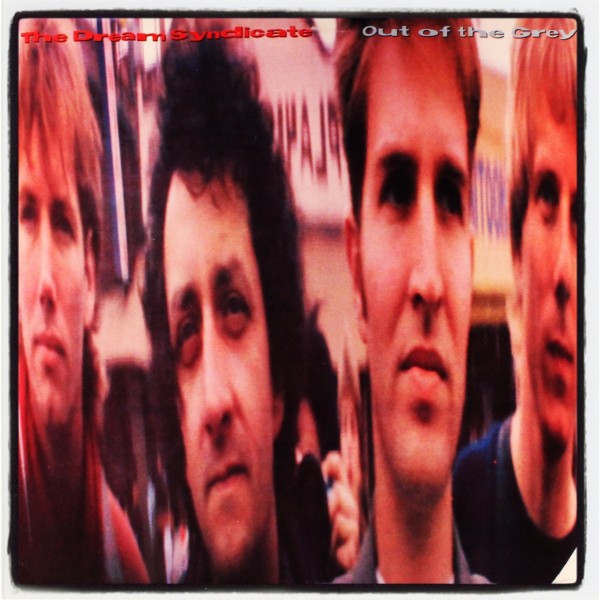EDITOR’S NOTE: This Q&A with Steve Wynn originally published back in the summer of 2013. In advanced of the re-activated Dream Syndicate’s performance at XPoNential Fest on Sunday, we present the encore edition.
ALL MUSIC GUIDE: Dream Syndicate are at the foundation (alongside the Velvet Underground, the Stooges, and R.E.M.) of contemporary alternative music simply because at the time when most bands were experimenting with new technology, the Syndicate deigned to bring back the guitar. Fronted by Steve Wynn (b. Feb. 21, 1960) and including Karl Precoda (guitar), Dennis Duck (drums), and Kendra Smith (bass), the band formed in Los Angeles after Smith and Wynn had relocated there from Davis, CA. They debuted with a self-titled, unbelievably Velvet Underground-like EP on Wynn‘s own Down There label. It was shortly off to Ruby/Slash for Days of Wine and Roses, the most lauded record on the college charts that year. The record has been cited as influential from artists as diverse as Kurt Cobain to the Black Crowes’ Chris Robinson. Live, they had developed into an assaultive guitar band prone to jamming, which helped earn them the tag as leaders of L.A.’s paisley underground movement. MORE
____________
PHAWKER: So, a couple of things I need to tell you before I get started. One is, I’m dating myself here, I actually saw The Dream Syndicate open for R.E.M. at the Beacon Theater, 1984, in New York City.
STEVE WYNN: Wow, yeah I remember that.
PHAWKER: I guess they were touring on Reckoning and you guys were touring on, what, Medicine Show?
STEVE WYNN: Yep, each of our second records.
PHAWKER: Yeah. And also, I used to play in a band called the Psyclone Rangers, and we used to cover “Halloween,” so the torch was carried for you guys on the East Coast in the early ‘90s. We were keepin’ the dream of the ’80s alive.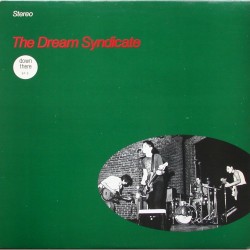
STEVE WYNN: You still playing?
PHAWKER: No, I’m retired now, Steve. Retired rock star.
STEVE WYNN: You never know — every band’s reuniting right now.
PHAWKER: That is true! Well, I’m waiting for the call from Jeff Tweedy myself. But anyways, let’s start at the beginning. University of California at Davis, your schoolmates include Kendra Smith and Russ Tolman? And then Russ started up True West and Kendra played bass in the first version of The Dream Syndicate and then would go on to do stuff with Dave Roback from The Rain Parade and Mazzy Star. Thin White Rope, I think, was from up there too, was that right?
STEVE WYNN: Yeah. It would seem like it was a pretty active scene, although it was just like 50 people who had cool record collections at the time.
PHAWKER: So you guys eventually moved back to Los Angeles, you adopt the name Dream Syndicate, borrowed from the title of Tony Conrad (backed by Faust)’s experimental minimalist ‘60s classic, Outside The Dream Syndicate. Was there ever any blowback on that, on using the name, or…?
STEVE WYNN: Well, we didn’t know. Let me rephrase that. It’s not that we didn’t know about the Tony Conrad connection. When Kendra and I came to L.A., we were joined by Karl Precoda and next thing you know, we were joined by Dennis Duck who was actually, to us, he was a rock star. He was in the band called Human Hands where very popular. And so, when he joined the band, we were fishing around for a name, and he came up with The Dream Syndicate, and we had a name. I said, “Where’d you get that from?” and he had pulled out a record called Outside The Dream Syndicate by Tony Conrad. And, you know, starting a band, first of all, it’s hard to agree with a name. Second of all, you think it’s not going to matter anyway because you’re probably going to play a couple of shows and break up or whatever. And here we are 30 years later, we’re still talking about it. What we didn’t know that the Dream Syndicate was the name of the band that John Cale had before the Velvet Underground. On our first tour we played Buffalo and it turns out that Tony Conrad lived there. We heard he was coming and we were kind of nervous that he would show up with a lawyer saying, “You can’t use the name anymore.” Which had happened to our friends in Red Cross and the Salvation Army. But instead he came to the show, he came backstage, and said, “You guys were great. You are the perfect band to carry our name forward.”
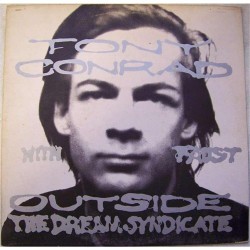 PHAWKER: I wanted to ask you about The Velvets comparisons, which you guys got a lot of. Did you find that to be annoying or belittling or did you guys like the comparison?
PHAWKER: I wanted to ask you about The Velvets comparisons, which you guys got a lot of. Did you find that to be annoying or belittling or did you guys like the comparison?
STEVE WYNN: We were maybe a little oversensitive to it. Because, let’s face it there aren’t that many great bands in the industry of rock. You know, to be compared to The Velvets, especially in a time when to say that kind of thing was actually flattering, now that I look back it’s one of the reasons that so many people liked us, and so many cool people liked us because we reminded them of their favorite band. That’s great. But we kind of bristled at that. We sort of were defensive with that because we thought that we were much more than just a one-trick pony. We thought that we were more than just a band that was existing to remind you of the Velvets and it’s true. I thought that then and I think it now. When I listen to The Days Of Wine And Roses or old shows of ours. Sure I hear, you know, I hear “Heroin” and “Sister Ray” but I also hear The Fall, who I was maybe more obsessed with at the time. I hear Black Flag in Karl [Precoda’s] playing and I hear Creedence and I hear so many things. We were all music fanatics and we would liberally steal from everything around us, not just one band.
PHAWKER: You guys were lumped in with the so-called “Paisley Underground” scene. Were you down with that or did you find that name to be cloying or precious…?
STEVE WYNN: I never minded. The great thing is the scene was a really great scene for the one year that it truly was a scene. Like, the one year where we were playing together and hanging out together and influencing each other. It was great. I mean, I loved all the bands. So it was exciting, it was our little scene against the world. I didn’t think we were all the same-sounding, but I think we all had a similar attitude that was kind of unique at the time.
PHAWKER: The embrace of ‘60s music really flew in the face of punk orthodoxy at the time.
STEVE WYNN: We would love flying in the face of anything that we could possibly fly in the face of at the time. If the ‘60’s scenesters embraced us, we tried to sound more ‘70s. If punk rockers liked us, we’d play a 15-minute song. If people like The Days Of Wine And Roses we turned the songs inside out and changed the tempo and the arrangement. If we played a show the way we had written and recorded a song, we’d feel like we had copped out. And maybe looking back, we might have tried a little too hard to kind of pound and confront people.
PHAWKER: The Days Of Wine And Roses, now widely acknowledged as a modern classic, turns 30 this year. What do you remember about making that record, and why do you think that clicked the way it did?
STEVE WYNN: It was pretty crazy. For a recording session that led to me being able to make music for the next 30 years, and hopefully beyond, it was a pretty inauspicious situation. It was done in three 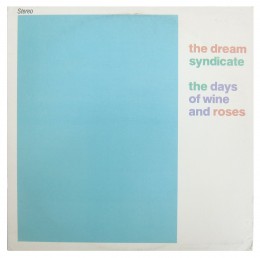 midnight to eight sessions for three consecutive days and we all had day jobs at the time, too. We were beyond excited that we were going to make a real record, so we went along with it, filled adrenaline from the situation, and eating junk food and sipping on vodka at four in the morning to kind of keep the adrenaline going or whatever else it took. We managed to kind of catch the moment and represent all the things we were doing on stage at the time. So, it worked out great. It couldn’t have gone better. I look back at that record, and I love everything about it. I think the limitations we had, the fact that we didn’t have much time and much money, helped as well because it just made us do what we were all about. And we had no fear.
midnight to eight sessions for three consecutive days and we all had day jobs at the time, too. We were beyond excited that we were going to make a real record, so we went along with it, filled adrenaline from the situation, and eating junk food and sipping on vodka at four in the morning to kind of keep the adrenaline going or whatever else it took. We managed to kind of catch the moment and represent all the things we were doing on stage at the time. So, it worked out great. It couldn’t have gone better. I look back at that record, and I love everything about it. I think the limitations we had, the fact that we didn’t have much time and much money, helped as well because it just made us do what we were all about. And we had no fear.
PHAWKER: Any memories of opening for U2? Did you guys actually go on tour with U2 or was it just a couple of shows?
STEVE WYNN: A whole tour! Coast to coast. We did three weeks of shows from New Haven out to Portland. It was just after The Days Of Wine And Roses. It came out of nowhere. They were definitely a band that was checking out what was going on around them, and getting a lot of press at the time. They certainly watched our shows, and we’d see The Edge with watch our sound checks, and Carl would insist that he was stealing feedback ideas from him.
PHAWKER: [Laughs] And then the R.E.M. tour would have been after the next album, Medicine Show. R.E.M. was on their way to becoming the biggest band in the land. It must have been a pretty exciting time to be on the road with them.
STEVE WYNN: On both the U2 and the R.E.M. tours, we were on the verge of exploding, or had exploded, and it was great to see that. And also, it was full of competitive spirit, very friendly competitive spirit in the case of R.E.M. because we liked them. It’s funny to look back now, because oh my god we were just little ants compared to what they were doing. They had already had a Top 40 record. But in our minds, we were The Stones to their Beatles.
PHAWKER: I read a quote that the band was kind of embraced by the L.A. scene almost right out of the gate and that you guys didn’t have to pay much in the way of dues and that that might have been a curse in disguise.
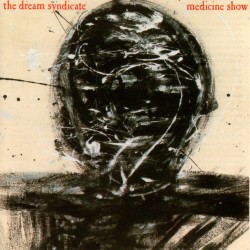 STEVE WYNN: In a way, it was. I mean, it happened very quickly. We had all been in bands; we had all played fifth on the bill to three people on a Tuesday night in a local punk rock club. We had done that, so it wasn’t like we had never paid dues at all. But it did happen so fast, our record came out and was on all of the indie charts immediately. It happened so fast and there was a period of six months where I knew if I walked into my local newsstand and I’d pick up any music magazine, we’d be in it. It’s just kind of exciting. It’s thrilling, especially if you cared about your band and the history of rock music like we did. But at the same time, yeah, it kind of throws you off of your game. From Nirvana to The Beatles, that kind of instant success affects you in some way, be it positive or negative. And the way that it affected us was it kind of made us push things further outside, you know? And you would see a lot of bands that would say, “Great, now we’re going for the brass ring.” Unfortunately the one thing that bands rarely do, and I think actually R.E.M. did do it, was just say, “We’re gonna put our heads down, ignore everything around us, and just do what we do.” And I think we didn’t really do that. We were a little too hyper-aware.
STEVE WYNN: In a way, it was. I mean, it happened very quickly. We had all been in bands; we had all played fifth on the bill to three people on a Tuesday night in a local punk rock club. We had done that, so it wasn’t like we had never paid dues at all. But it did happen so fast, our record came out and was on all of the indie charts immediately. It happened so fast and there was a period of six months where I knew if I walked into my local newsstand and I’d pick up any music magazine, we’d be in it. It’s just kind of exciting. It’s thrilling, especially if you cared about your band and the history of rock music like we did. But at the same time, yeah, it kind of throws you off of your game. From Nirvana to The Beatles, that kind of instant success affects you in some way, be it positive or negative. And the way that it affected us was it kind of made us push things further outside, you know? And you would see a lot of bands that would say, “Great, now we’re going for the brass ring.” Unfortunately the one thing that bands rarely do, and I think actually R.E.M. did do it, was just say, “We’re gonna put our heads down, ignore everything around us, and just do what we do.” And I think we didn’t really do that. We were a little too hyper-aware.
PHAWKER: So how did that have a negative impact? You started believing your own press?
STEVE WYNN: No, I think the negative thing was…let me put it this way. The one regret that I’ve always had is that there wasn’t a record between Days Of Wine And Roses and Medicine Show. I would like to have seen us kind of take what we were doing [on Days Of Wine And Roses] and sort of do it again but one step further, or do it again but one with a slight slant. Instead we just turned it into a completely different band in the space of a year, and it was a very cool band and a band true to what we were feeling and what we felt we needed to be doing. But it would have been nice if, somewhere in between, we could have dashed another one out.
PHAWKER: Because the shift was so radical that it threw a lot of your original audience off the trail?
STEVE WYNN: Yes, a little, but people really went along with us. There was maybe some backlash from the critics those days, but two things happened: One, most of our fans loved it. People still came out and loved what we were doing. And in the same time in Europe, where they really weren’t on board when The Days Of Wine And Roses came out, they went bonkers for Medicine Show. Loved it. Loved it then and till this day. So there’s no point of comparison for that record over there. It was this new band, they made this completely uncompromising, crazy, dark record and they’re thrilled to hear it.
PHAWKER: But Kendra Smith leaves the band somewhere after The Days Of Wine And Roses and before Medicine Show, is that correct?
STEVE WYNN: Yes, and not long after The Days Of Wine And Roses, right after our first tour which was in February, and it was May when she left the band.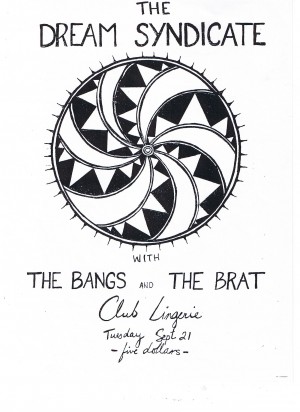
PHAWKER: And she just didn’t want to tour anymore? She didn’t want to…?
STEVE WYNN: You know, I’d be guessing then, I’d be guessing now. I think a combination of things. I think it was a fun but a hard tour. And I think, the main thing is she had started going out with David Roback and I think that’s probably more attractive to her to work with her very talented boyfriend with his band. That’s probably more exciting than going out with us again at that point. It was hard, because she was an old friend and I was really disappointed, but over time I got it, she did what she had to do.
PHAWKER: Are you still in touch with her at all? What is she up to these days?
STEVE WYNN: I’m rarely in contact with her these days, but when I am it’s always really great. She’s kind of the enigmatic, hermit-like legendary character. And I think that no one really knows what she’s up to. If I sound hesitant to talk about it, it’s a combination of me not knowing the whole story and not being comfortable sharing the part of the story I do know. She kind of removed herself — first from our band, then from the scene, the city, some ideas of civilization if we went to that extreme, probably. But she did that, and I thought, “Well, that would be an interesting period. You know, but I guess she’ll get sick of that.” But you know, years later, she’s still living out west, that’s great. There are times that I would love to play with her again but I also think it probably won’t ever happen.
PHAWKER: And then how about what happened with Karl Precoda? Why did Karl leave?
STEVE WYNN: Well, that was the hard thing. That was, you know, the case of two people being friends and collaborators and teammates and everything and believing what they’re doing to excess or having influences or chemical influences, you name it. Whatever it was, it pushed us just further and further apart. We went from being Siamese Twins to…we were young, and a lot was going on, and it affected us in different ways, ways that weren’t compatible. I felt success was this was a great chance to make the most outside record I’ve ever made, the kind of records I always loved, the deep left turn records — Big Star Third, Neil Young Tonight’s The Night, Plastic Ono Band. Artists that went mainstream and then kind of shattered what they were all about. That’s where I wanted to go. Karl saw success and wanted to really go for it and be a big rock band. Like I said earlier, those are both valid responses, but those things can’t exist side by side, so any time that I would do something that was completely a little bit self-sabotaging, which I thought was cool, I was just ruining his day. And every time he did something smack dead mainstream I hated, he was ruining mine. I think that, what began as a small rift, kind of grew and grew and after a while things just couldn’t get back together.
PHAWKER: I read somewhere that he pursued screenwriting after the band. Is he still doing that? Are you in touch with him at all?
STEVE WYNN: Sadly, we’re not in touch, and that’s the way it is. Not for lack of trying on my part. I’ve tried to get in touch, but he doesn’t want any part of that part of his past. But I do know that he is a professor of literature and theater at Virginia Tech. He is Dr. Precoda now. I’ve seen pictures of him wearing, I kid you not, tweed coats and looking every bit the academic. And he came from an academic family. His father was a professor as well. He went in a direction that kind of made sense. He’s done a few cool things over the years, but not much.
PHAWKER: Interesting. So how did this reunion come about? What prompted it? Had you resisted it for a long, long time?
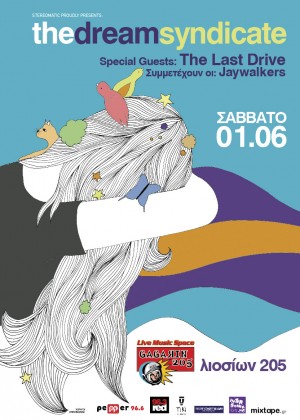 STEVE WYNN: It was always a possibility, and people asked about it, but we resisted for a long time, really just because I liked what I was doing at the time. And in times that the band broke up in 1989, almost twenty five years ago, in that time, I had been making a lot of records that I really liked, and that other people liked too with side projects like The Gutterball and The Baseball Project. It just didn’t seem like anything I wanted to do. I mean, I’ve remained really good friends with Dennis Duck and Mark Walton and Paul Cutler as well, who replaced Karl. We’ve all stayed great friends. And the reunion happened last year, a completely random event, but a friend of mine in Spain was doing a benefit for pediatric diseases, and he wanted me to be a part of it, wanted me to bring one of my bands over. I checked with both of my bands, The Miracle Three and The Baseball Project and neither band could do it. I thought, “I want to do this show.” And just out of complete spontaneous impulsive thought, “Why not The Dream Syndicate?” “We’ll do this, we’ll have some fun we’ll see how people react. And if we don’t like it, if the bands don’t like it, if people don’t get excited, whatever, it will have been a nice little diversion and we’ll call it a day. If we like it, we’ll keep doing it.”
STEVE WYNN: It was always a possibility, and people asked about it, but we resisted for a long time, really just because I liked what I was doing at the time. And in times that the band broke up in 1989, almost twenty five years ago, in that time, I had been making a lot of records that I really liked, and that other people liked too with side projects like The Gutterball and The Baseball Project. It just didn’t seem like anything I wanted to do. I mean, I’ve remained really good friends with Dennis Duck and Mark Walton and Paul Cutler as well, who replaced Karl. We’ve all stayed great friends. And the reunion happened last year, a completely random event, but a friend of mine in Spain was doing a benefit for pediatric diseases, and he wanted me to be a part of it, wanted me to bring one of my bands over. I checked with both of my bands, The Miracle Three and The Baseball Project and neither band could do it. I thought, “I want to do this show.” And just out of complete spontaneous impulsive thought, “Why not The Dream Syndicate?” “We’ll do this, we’ll have some fun we’ll see how people react. And if we don’t like it, if the bands don’t like it, if people don’t get excited, whatever, it will have been a nice little diversion and we’ll call it a day. If we like it, we’ll keep doing it.”
PHAWKER: Might you guys even record at some point?
STEVE WYNN: We talked about it. And I would definitely wouldn’t rule it out. I can hear a record in my head that I’d like to do with this band, and they’re pretty excited about it. I’m pretty excited about it. But I’m not going to even think about stuff until these tour dates are over.
PHAWKER: You guys were a great live band. That Live At Raji’s record sounds incredible.
STEVE WYNN: You know, a lot of people think that’s our best record. I was really happy to see last year the Japandroids, who are a great band, were out there touring around and talked about in the press in their interviews and everything how [Live At Raji’s] was a big influence on making their new record, and that threw me for a loop, because wow, a live record from a Hollywood club that had that effect? I’m proud of the records we made back then, but I think that in a way, playing live was what we did the best.
THE DREAM SYNDICATE WILL PERFORM @ XPONENTIAL FEST ON SUNDAY

